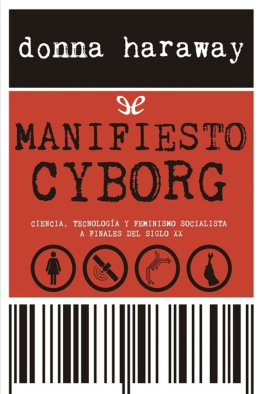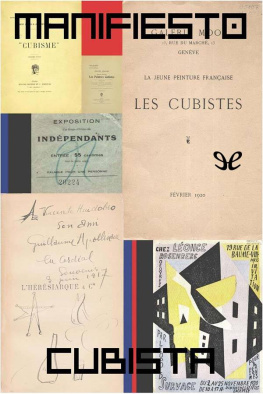Donna Haraway - Manifiesto Cyborg
Aquí puedes leer online Donna Haraway - Manifiesto Cyborg texto completo del libro (historia completa) en español de forma gratuita. Descargue pdf y epub, obtenga significado, portada y reseñas sobre este libro electrónico. Año: 1984, Editor: ePubLibre, Género: Historia. Descripción de la obra, (prefacio), así como las revisiones están disponibles. La mejor biblioteca de literatura LitFox.es creado para los amantes de la buena lectura y ofrece una amplia selección de géneros:
Novela romántica
Ciencia ficción
Aventura
Detective
Ciencia
Historia
Hogar y familia
Prosa
Arte
Política
Ordenador
No ficción
Religión
Negocios
Niños
Elija una categoría favorita y encuentre realmente lee libros que valgan la pena. Disfrute de la inmersión en el mundo de la imaginación, sienta las emociones de los personajes o aprenda algo nuevo para usted, haga un descubrimiento fascinante.
- Libro:Manifiesto Cyborg
- Autor:
- Editor:ePubLibre
- Genre:
- Año:1984
- Índice:5 / 5
- Favoritos:Añadir a favoritos
- Tu marca:
- 100
- 1
- 2
- 3
- 4
- 5
Manifiesto Cyborg: resumen, descripción y anotación
Ofrecemos leer una anotación, descripción, resumen o prefacio (depende de lo que el autor del libro "Manifiesto Cyborg" escribió él mismo). Si no ha encontrado la información necesaria sobre el libro — escribe en los comentarios, intentaremos encontrarlo.
Manifiesto Cyborg — leer online gratis el libro completo
A continuación se muestra el texto del libro, dividido por páginas. Sistema guardar el lugar de la última página leída, le permite leer cómodamente el libro" Manifiesto Cyborg " online de forma gratuita, sin tener que buscar de nuevo cada vez donde lo dejaste. Poner un marcador, y puede ir a la página donde terminó de leer en cualquier momento.
Tamaño de fuente:
Intervalo:
Marcador:
● Athanasiou, Tom (1987) “High-tech politics: the case of artificial intelligence”, Socialist Review.
● Bambara, Toni Cade (1981) The Sait Eaters. New York: Vintage/Random House.
● Baudrillard, Jean (1983) Simulations, P. Foss, P. Patton, P. Beitchman, trans. New York: Semiotext[e].
● Bird, Elizabeth (1984) “Creen Revolution imperialism, I & II”, papers delivered at the University of California, Santa Cruz.
● Bleier, Ruth (1986) Feminist Approaches to Science. New York: Pergamon.
● Blumberg, Rae Lessor (1981) Stratification: Socioeconomic and Sexual Inequality. Boston.
● Brown (1983) “A general theory of sex Stratification and its application to the positions of women in today’s worid economy”, trabajo presentado en el Sociology Board, University of California at Santa Cruz.
● Burke, Carolyn (1981) “Irigaray through the looking glass”, Feminist Studies 7 (2): 288-306.
● Burr, Sara G. (1982) “Women and work”, in Barbara K. Haber, ed. The Women’s Annual 1981. Boston. G. K. Hall.
● Busch, Lawrence and Lacy, William (1983) Science, Agricullure and the Politics of Research. Boulder, CO: Westview.
● Butler-Evans, Elliott (1987) “Race, gender and desire: narrative strategies and the production of ideology in the fiction of Toni Cade Bambara, Toni Morrison and Alice Waiker”, University of California at Santa Cruz, PhD thesis.
● Carby, Hazel (1987) Reconstructing Womanhood: The Emergence of the Afro-American Woman Novelist. New York: Oxford University Press.
● Clifford, James (1985) “On ethnographic allegory”, en James Clifford and Georges Marcus, eds. Writing Culture: The Poetics and Politics of Ethnography. Berkeley: University of California Press.
—(1988) The Predicament of Culture: Twentieth-Century Ethnography, Literature and Art. Cambridge, MA: Harvard University Press.
● Cohn, Carol (1987a) “Nuclear language and how we learned to pat the bomb”, Bulletin of Atomic Sdentists, pp. 17-24.
—(1987b) “Sex and death in the rational worid of defense intellectuals”, Signs 12 (4): 687-718.
● Collins, Patricia Hill (1982) “Third World women in America”, in Barbara K. Haber, ed. The Women’s Annual, 1982. Boston: G. K. Hall.
● Cowan, Ruth Schwartz (1983) More Work for Mother: The Ironies of Household Technology from the Open Hearth to the Microwave. New York: Basic.
● Christian, Barbara (1985) Black Feminist Criticism: Perspectives on Black Women Writers. New York: Pergamon.
● Daston, Lorraine and Park, Katherine (n. d.) “Hermaphrodites in Renaissance France”, trabajo no publicado.
● Derrida, Jacques (1976) Of Grammatology, G. C. Spivak, trans. and introd. Baltimore: Johns Hopkins University Press.
● de Waal, Frans (1982) Chimpamee Politics: Power and Sex among the Apes. New York: Harper & Row.
● D’Onofrio-Flores, Pamela and Pfaffiin, Sheila M., eds (1982) Scientific-Technological Change and the Role of Women in Daevelopment. Boulder: Westview.
● Douglas, Mary (1966) Purity and Danger. London: Routledge & Kegan Paul.
—(1970) Natural Symbols. London: Cresset Press.
● DuBois, Page (1982) Centaurs and Amazons. Ann Arbor: University of Michigan Press.
● Duchen, Claire (1986) Feminism in France from May ‘68 to Mitterrand. London: Routledge & Kegan Paul.
● Edwards, Paul (1985) “Border wars: the science and politics of artificial intelligence”. Radical America 19(6): 39-52.
● Enloe, Cynthia (1983a) “Women textile workers in the militarization of Southeast Asia”, in Nash and Fernández-Kelly (1983), pp. 407-25.
—(1983b) Does Khaki Become You? The Militamatím of Women’s Lives. Boston: South End.
● Evans, Mari, ed. (1984) Black Women Writers: A Critical Evaluation. Carden City, NY: Doubleday/Anchor.
● Fausto-Sterling, Anne (1985) Myths of Gender: Biological Theories about Women and Men. New York: Basic.
● Fernández-Kelly, María Patricia (1983) For We Are Sola, I and My People. Albany: State University of New York Press.
● Fisher, Dexter, ed. (1980) The Third Woman: Minority Women Writers ofthe United States. Boston: Houghton Miffltn.
● Flax, Jane (1983) “Political philosophy and the patriarchal unconscious: a psychoanalytic perspective on epistemology and metaphysics”, in Harding and Hintikka (1983), pp. 245-282.
● Fraser, Kathleen (1984) Something. Even Human Voices. In the Foreground, a Lake. Berkeley, CA: Kelsey St Press.
● Gates, Henry Louis (1985) “Writing “race” and the difference it makes”, in ‘Race’, Writing, and Difference, special issue, Critical Inquiry 12 (I): 1-20.
● Giddings, Paula (1985) When and Where I Enter: The Impact of Black Women on Race and Sex in America. Toronto: Bantam.
● Gilbert, Sandra M. and Gubar, Susan (1979) The Madwoman in the Attic: The Woman Writer and the Nineteenth-Century Uterary Imagination. New Haven, CT: Yaie University Press.
● Gordon, Richard (1983) “The computerization of daily life, the sexual division of labor, and the homework economy”, Silicon Valley Workshop conference, University of California at Santa Cruz.
● —and Kimball, Linda (1985) “High-technology, employment and the challenges of education”, Silicon Valley Research Project, Working Paper, n.º 1.
● Gould, Stephen J. (1981) Mismeasure of Man. New York: Norton.
● Griffin, Susan (1978) Woman and Nature: The Roaring Inside Her. New York: Harper & Row.
● Grossman, Rachel (1980) “Women’s place in the integrated circuit”. Radical America 14 (I): 29-50.
● Haas, Violet and Perucci, Carolyn, eds (1984) Women in Scientific and Engineering Professions. Ann Arbor: University of Michigan Press.
● Hacker, Sally (1981) “The culture of engineering women, workplace, and machine”, Women’s Studies International Quaterly, 4 (3): 341-53.
● —(1984) “Doing it the hard way: ethnographic studies in the agribusiness and engineering classroom”, trabajo presentado en la California American Studies Association, Pomona.
—and Bovit, Liza (1981) “Agriculture to agribusiness: technical imperatives and changing roles”, trabajo presentado en la Society for the History of Technology, Milwaukee.
● Haraway, Donna J. (1979) “The biological enterprise: sex, mind, and profit from human engineering to sociobiology’. Radical History Review 20: 206-37.
—(1983) “Signs of dominance: from a physiology to a cybernetics of primate society”, Studies in History of Biology 6: 129-219.
—(1984) “Class, race, sex, scientific objects of knowledge: a socialist-feminist perspective on the social construction of productive knowledge and some political consequences”, in Violet Haas and Carolyn Perucci (1984), pp. 212-29.
—(1984-5) “Teddy bear patriarchy: taxidermy in the Garden of Edén, New York City, 1908-36″, Social Text 11: 20-64.
—(1989) “Review of A. Ong, Spints of Resístame and Capitalist Discipline” Signs 14 (4): 945-7
—(1991) Simians, Cyborgs and Women. The Reinvention of Nature. New York: Routledge.
● Harding, Sandra (1986) The Science Question in Feminism. Ithaca: Cornell University Press.
—and Hintikka, Merill, eds (1983) Discovering Reality: Feminist Perspectives on Epistemology, Metaphysics, Methodology, and Philosophy of Science. Dordrecht: Reidel.
● Hartsock, Nancy (1983a) “The feminist standpoint: developing the ground for a specifially feminist historical materialism”, in Harding and Hintikka (1983), pp. 283-310.
—(1983b) Money, Sex, and Power. New York: Longman; Boston: Northeastern University Press, 1984.
Tamaño de fuente:
Intervalo:
Marcador:
Libros similares «Manifiesto Cyborg»
Mira libros similares a Manifiesto Cyborg. Hemos seleccionado literatura similar en nombre y significado con la esperanza de proporcionar lectores con más opciones para encontrar obras nuevas, interesantes y aún no leídas.
Discusión, reseñas del libro Manifiesto Cyborg y solo las opiniones de los lectores. Deja tus comentarios, escribe lo que piensas sobre la obra, su significado o los personajes principales. Especifica exactamente lo que te gustó y lo que no te gustó, y por qué crees que sí.








